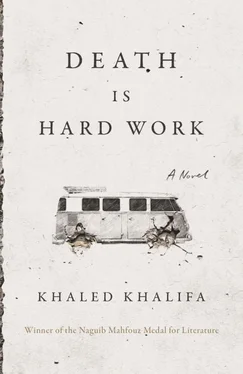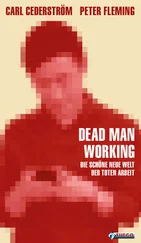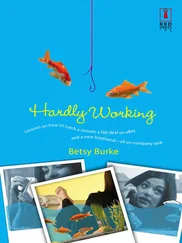Hussein, in his place behind the wheel, was looking angrily at his watch and muttering inaudibly. One of the waiting truck drivers approached him and said plainly, “No goods can get through without the right documents .” Hussein quickly got out of the minibus and went up to the makeshift office. He paid a bribe known as a goods-transit document, and their identity cards were returned. Feeling strangely victorious, he sped them all away from the checkpoint. Bolbol was thinking over the fact that his father was now a commodity like hookah coals, crates of tomatoes, sacks of onions. His ongoing silence discomfited Hussein, who announced that he had paid a thousand liras, and that they had to reach Anabiya before midnight.
For a moment Bolbol found himself wondering whether it might not be better to return to Damascus and arrange the burial in one of the graveyards there—although he knew this was absurd given how expensive graves were in Damascus. A good grave was so rare that people had begun advertising them in the classified ads, and they only had thirty-five thousand liras left among the three of them… Returning was out of the question; even if they had the money, how would they obtain official permission for a burial? Moreover, how could they convince the next shift of soldiers at the checkpoints they’d already passed that they had changed their minds? Or, indeed, that Abdel Latif had died in Damascus and not in a rebel town nearby?
After all, as a general rule, corpses don’t much care about where they’re buried. Just thinking about it frustrated Bolbol no end. It was a little past noon, he was tired, and he was fed up. Fatima lifted the blanket from her father’s face, telling herself that a little fresh air, though cold, might do him good. She opened her window, even though the dead don’t breathe and aren’t likely to care whether the air is fresh or not. Bolbol told her to cover the body back up so the ice blocks packed tightly around it wouldn’t melt, and Fatima complied without demur. Bolbol was now hoping they could all just ride in silence until they reached Anabiya. Their relatives would take care of the burial itself, and afterward he could escape from his family for the last time. He would go back to his nest and skulk in his room like a rat until his dream of moving to a faraway country was realized. There, in that distant land, he would inter himself in snow, and he would never complain about anything ever again. Right now, though, he couldn’t keep from dwelling on the cramped and uncomfortable interior of the minibus, not to mention whatever surprises were bound to lie in store for them farther down the road, which he anticipated with dread. He couldn’t think of anyone having successfully managed to transport a body all the way to Anabiya in three whole years.
Hussein felt uneasy at the silence, and since his memory didn’t furnish him with a suitable pearl of wisdom, he snapped at Fatima to stop opening the window and then reminded his siblings spitefully that they wouldn’t arrive at Anabiya before midnight, perhaps not even before dawn. Then he glanced at them in the rearview mirror, and the three of them exchanged looks of fear. All of their calculations had gone up in smoke; they’d already been delayed longer than they could have anticipated; there were few cars on the road, and the distant, blank wilderness—everything they could see, in fact—only made them more afraid.
At the beginning of the national highway, cars were turning onto a side road. Hussein asked a taxi driver if the highway was closed, and the man replied that there was a sniper up there, and he wasn’t allowing anyone to pass. “He got them three hours ago,” the driver added, pointing to four bodies lying on the road ahead: a man, a woman, a young man, and a girl. Bolbol considered the fact that they had chosen to die as they had lived: as a family. Hussein swerved the minibus onto the side road, following the other cars, and winding up in a series of narrow lanes. Somewhere nearby was being bombed, so close to them that they could see the bombs dropping out of the plane. Shrapnel was scattering around them. Hussein tried to block out everything but the road ahead. The last thing they needed was to find themselves pinned down in the middle of some burned-out olive grove.
A large number of cars were ahead of them. Doubtless one of the other drivers knew a safe route and was leading the charge. Bolbol wondered if they would wind up trapped where they were, but when he saw that all the other cars were now returning to the highway, hope was renewed. Hussein was already praising his own ingenuity in saving them from disaster; Bolbol was interested only in getting back to brooding about their dead father and wished Hussein would shut up. Bolbol noticed that the body was listing over; he tried to rearrange it to make it more stable. He considered tying it up somehow but wasn’t prepared to have the debate this suggestion would open. Fatima reminded them of the sandwiches she’d brought for their long journey, and Hussein suggested that they pull over at the nearest rest stop when they began the approach to Homs. Bolbol hadn’t eaten anything since the previous night. In his view, it was indecent to worry about food so soon after a parent’s death.
Fatima was silent and put the sandwiches back in the plastic bag. Bolbol avoided looking at the right-hand side of the road. He was used to the sound of low-flying planes, the sounds of artillery and rocket launchers; for three years now there hadn’t been a break in the noise. The bombardment of Qaboun and Jobar never stopped, and they could see traces of it on the buildings along the highway, but Bolbol wasn’t interested—he remained indifferent to it all. Hussein drew their attention to the Qatifa checkpoint in the distance and said he would get right into the truck lane to save time. Bolbol made no objection and gave him some of his money. On the one hand, of course, Bolbol told himself, this was all a humiliating and ignominious experience, but then, on the other, it was difficult not to consider his father rather fortunate, given the thousands of corpses left out for birds of prey and other hungry scavengers… He tried not to dwell upon the four sniper victims who’d been left back on the highway, where no one dared to approach them, but his mind betrayed him, and he couldn’t get the thought of them out of his head. All he wanted to do was lie down next to his father as he had done when he was a small boy, but the same fear that made him long for that comfort prevented him from sleeping so close to a dead man.
The long procession of trucks was exasperating; it would be hours before their turn came. Bolbol expected Hussein to try and expedite matters, but like him, Hussein was getting scared. He didn’t dare to speak with the obviously irritable checkpoint guards. But Bolbol guessed that the agents manning the checkpoints were probably afraid, too; perhaps they would take pity on a dead man? He got out of the minibus and went over to the nearest officer and explained the situation with a concise and well-worded speech, but the officer didn’t hear him; too many other people were talking to him as well, and Bolbol’s voice was as weak and frightened as a wet baby bird in a moldy room. There was nothing for it: they were stuck in the line, with no way out. They were besieged by cars from all sides, and huge cement barriers prevented any vehicle from leaving its lane. On his way back to the minibus, Bolbol saw that Hussein was incensed at his behavior, as usual. He was telling Fatima that Bolbol was an idiot, a ditherer who had waited for them to reach the point of no return before lifting a finger to help, and then still failed to talk to the officer and convince him of their extraordinary circumstances. Fatima tried her best to alleviate the tension by telling both her brothers about her sister-in-law, who had been released from prison the previous week. The girl’s face had turned yellow, she had lost half her body weight, and her head had been shaved to the bone. At night she raved deliriously. Fatima was sure she had been raped while she was inside. Hussein was ready to provide some pithy response, but Fatima went on, saying that the girl had scabies, too, so her family had been forced to isolate her in an old chicken coop on the roof, after all of which her fiancé dropped her and demanded compensation from her family.
Читать дальше












